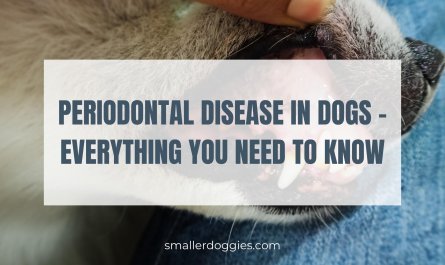Post Disclaimer
This post may contain affiliate links. If you use these links to buy something we earn a commission at no extra cost to you. Smaller Doggies is supported by its audience, Thank you!
Unpacking the Top Health Concerns for Your Petite Pooch: A Guide for Small Dog Owners
10 most common health problems in small dog breeds.
When you welcome a small dog into your life, you’re in for an adventure filled with boundless affection and loyalty. However, these pint-sized pups often come with their own unique set of health challenges. Understanding and addressing these common health issues is crucial for providing the best care for your furry companion. In this comprehensive guide, we’ll take a deep dive into each of the most common health problems affecting small dog breeds, empowering you with the knowledge you need to keep your little friend happy and healthy.
Genetic Predispositions: The Blueprint of Health
Imagine genetics as the blueprint for your dog’s health. Responsible breeding practices can help eliminate hereditary issues, ensuring a healthier lineage for future generations. Before adopting or purchasing a small dog, research the breed’s potential genetic concerns and select a reputable breeder who prioritizes genetic health.
Dental Issues: Tiny Teeth, Big Trouble
Small dogs may have petite pearly whites, but that doesn’t mean they’re immune to dental problems. Due to their compact mouths, their teeth can overcrowd, creating the perfect breeding ground for issues like periodontal disease. Brushing your dog’s teeth regularly and scheduling professional dental cleanings are essential to preventing these painful and costly problems.
Orthopedic Conditions: Navigating Joint Woes
Orthopedic troubles like luxating patella (dislocated kneecap) and hip dysplasia can be more prevalent in small dog breeds due to their dainty frames. Keep your pup’s joints in top shape by providing the right nutrition, maintaining a healthy weight, and ensuring they get enough exercise.
Respiratory Problems: The Challenge of Breathing Easy
Many small breeds face respiratory difficulties due to their compact airways. Brachycephalic obstructive airway syndrome (BOAS) is a notable concern, particularly in flat-faced breeds like Bulldogs and Pugs. Be cautious about overexertion, especially in hot weather, as this can exacerbate breathing issues.
Heart Conditions: Matters of the Heart
Heart diseases, including mitral valve disease and congenital defects, are common among small dogs. Regular cardiac check-ups are crucial to detecting and managing these conditions early. Your veterinarian can provide guidance on medication and lifestyle adjustments to ensure your dog’s heart stays strong.
Skin and Allergies: Battling the Itch
Skin problems and allergies can plague your small dog. Environmental and food-related allergies may cause itching and discomfort. Work closely with your vet to identify and manage allergens effectively, potentially through dietary adjustments and allergen management.
Obesity: Weighty Matters
Small dogs are at risk of obesity, which can lead to various health issues, including joint problems, diabetes, and heart disease. Maintain a balanced diet, control portion sizes, and provide regular exercise to help your pup stay lean and healthy.
Eye Problems: Gazing into the Issues
Cataracts and retinal issues are common eye conditions in small breeds. Routine eye examinations can catch these problems before they become severe, preserving your dog’s precious eyesight.
Neurological Disorders: The Brain and Nerves
Neurological issues, such as epilepsy and intervertebral disc disease, can affect small dogs. Early diagnosis and treatment can help manage these conditions effectively, ensuring your furry friend’s quality of life.
Preventive Care and Monitoring: Your Proactive Role
Preventing common health problems in small dogs involves being proactive and vigilant. Regular vet check-ups, a healthy and balanced diet, and consistent exercise are your best allies. Watch for changes in behavior or physical condition, and seek prompt veterinary attention when needed.
In conclusion, while small dog breeds offer a world of companionship and charm, they also demand diligent care and attention to their unique health needs. By understanding and addressing these common health concerns, you can provide your petite pooch with the best possible quality of life. Your small dog is not just a pet but a cherished member of your family. Keep them happy, healthy, and thriving with responsible ownership and attentive healthcare.






